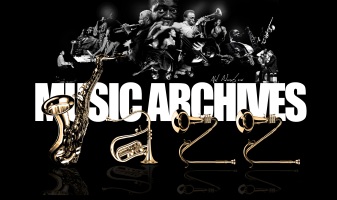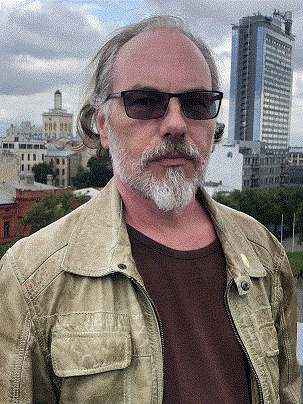During the decade from 1984 to 1994, before the rundown but artistically vibrant Hoxton Square in Shoreditch, east London, was gentrified, and jazz in the UK was in one of its cyclical booms, an old industrial building housed a basement jazz club called the Bass Clef. International hotshots, young local contenders, and celebrities including Leonard Bernstein and the jazz-loving former chancellor Kenneth Clarke rubbed shoulders there, but one of the most charismatic figures on the premises was the club’s proprietor, Peter Ind, who has died aged 93.
A genially welcoming presence, whose Gandalf-like white mane, plummeting beard, and air of ethereal distractedness gave him an air of benevolent wizardry, Ind was as likely to be seen on the bandstand playing bass with his guests as discussing music, and much else, with anyone and everyone.
He was no enthusiastic amateur, however, but a front-rank double bassist who had lived and worked with the best in 1950s New York, including Miles Davis, originators of the understated “Cool School” style, including the pianist Lennie Tristano and the saxophonist Lee Konitz, and the swing-era tenor sax pioneer Coleman Hawkins.
The polymathic Ind was also a creative record producer and engineer with his own studio and label, a skilful amateur painter, the author of an authoritative book on Tristano’s underrated genius, and a late-career ceramics restorer who taught himself that meticulous craft to help while away his 80s.
Ind was born in Uxbridge, west London, to Sidney Ind, a builder, and his wife, Amy (nee Sletcher). The boy learned the violin from the age of eight, and attended the newly opened Breakspear school in Uxbridge, where both his artistic and musical aptitudes were encouraged. He took up the piano, and by 16 was combining day-jobs and night-time piano-playing on local dance gigs to become the household’s primary breadwinner.
He formally studied piano and classical harmony in evening classes at Trinity College of Music between 1944 and 1946, and then took up the double bass, learning an unorthodox four-digit fingering technique from his first teacher, Tim Bell, which invited quicker and more intricate, semitone-based melodies than had been usual for the stately instrument.
Ind turned professional in 1947, and – like other young UK jazz players of the period, including Ronnie Scott and John Dankworth – began sailing to the US as a dance-band musician on the fortnightly transatlantic trips by the liner Queen Mary. He began regular lessons with Tristano, briefly joined the trumpeter Kenny Baker’s group in the UK in early 1951, and returned to New York that April to settle there.
He accompanied Tristano’s sextet on the 1954 debut of the soon-to-be-famous Newport jazz festival, and worked with the saxophonists Konitz and Warne Marsh, as well as with the Tristano-inspired expat German pianist Jutta Hipp. He was learning on the bandstand in the birthplace of the bebop movement, absorbing the rhythmic drive and harmonic awareness of some of its best practitioners at first hand.
Ind remained in the US throughout the 50s and into the next decade, working with Konitz, the pianist Marian McPartland, the drummer Buddy Rich, and at the Metropole Cafe in New York with Hawkins.
Between 1957 and 1961, he mixed life on the road on a motorbike with his canvases strapped to his back (to explore landscape painting from the Arctic Circle to Italy) with developing a sophisticated understanding of studio recording techniques – opening his own premises in Queens and Manhattan, helped by an inheritance following his father’s death.
Ind recorded extensively with Konitz – who became a lifelong friend – and with Marsh, the vocalist Sheila Jordan and others, as well as sound-engineering for the New York label Bethlehem and for Verve. In 1961, he launched his own label, Wave Records.
From 1963 to 1966, Ind lived and played in New York, and then in Big Sur, California. He was playing in a piano trio at a private beach party when one of the guests asked the group if they would try out a new tune he had just written. Ind would recall that he was noncommittal about its virtues at the time, but the tune turned out to be the Academy award- and Grammy-winning hit The Shadow of Your Smile, and the guest was the songwriter and Hollywood composer Johnny Mandel.
While in California, he began groundbreaking solo performances and broadcasts as an unaccompanied bass soloist – a new tributary of jazz subsequently taken up by many younger bassists.
Back in Britain from 1966, Ind became one of the founding tutors on the jazz course at the new Leeds Music Centre, nowadays Leeds Conservatoire, and also rekindled the Wave label, issuing archive material from his New York days, as well as new UK releases, and two solo-bass LPs.
He toured and recorded with Konitz and Marsh in the mid-70s, and recorded and played in the trombonist Keith Nicholls’ Music of the Roaring Twenties recreation of Paul Whiteman’s popular 1920s orchestra in 1975.
Following the relocation of Wave’s studio to Hoxton Square he opened his Bass Clef club in 1984 and subsequently its smaller upstairs sibling the Tenor Clef. Ind loved both the musical and social pleasures of being a player/proprietor, often sitting in with prestigious American visitors. But a decade later, a recession, VAT arrears, and Ind’s music-first idealism had the club on the ropes, and by April 1994 HMRC had seized all the saleable assets – a financial and emotional blow from which recovery came slowly.
But Ind used his later years well, continuing to play the bass (although eventually hampered by hearing loss and a minor stroke), and travelling and playing with performers from within and beyond jazz circles.
His book Jazz Visions: Lennie Tristano and His Legacy was published in 2007, and some personal reflections on ecology and Wilhelm Reich’s bio-energy theories, The Environment and Cosmic Metabolism: Looking at the Stars and Thinking About the Earth, in 2008.
With his second wife, Sue Jones, Ind lived and painted for part of the year at their house in Auvers-sur-Oise, Van Gogh’s village north of Paris. He received the special award for his contribution to jazz at the parliamentary jazz awards in 2015.
Ind is survived by Sue, whom he married in 2012, by his daughter, Gretchen, from his marriage to Barbara Schiffmacher, which ended in divorce, and by two granddaughters.









 Topic Options
Topic Options


 Post Options
Post Options Thanks(0)
Thanks(0)



